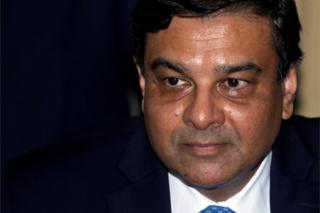Alarm as India central bank governor quits
India’s central bank governor Urjit Patel has resigned from his post citing “personal reasons”.
His resignation comes amid reports of a rift between the Reserve Bank of India (RBI) and Prime Minister Narendra Modi’s government.
This marks a rare case of a serving governor leaving his job midway through his three-year term.
Correspondents say the move is likely to undermine confidence in the economy and cause the rupee to fall.
Although India’s $2.6tn (€2.3tn; £2tn) economy has recently been boosted by a strong performance in consumer spending and manufacturing, the rupee has already fallen significantly against the surging dollar so far this year, private investment remains slack and there are doubts on whether the economy will accelerate further, says the BBC’s Soutik Biswas in Delhi.
India will vote in a general election in the first half of next year, with polls due by May.
In a statement announcing his resignation, Mr Patel thanked his staff and officers, calling them the reason for the “bank’s considerable accomplishments in recent years”.
But speculation has been mounting for weeks that Mr Patel could resign over government pressure on the bank.
RBI v Modi
In late October, RBI Deputy Governor Viral Acharya fired what appeared to be a broadside against attempts to undermine the bank’s independence.
“Governments that do not respect central bank independence will sooner or later incur the wrath of the financial markets, ignite economic fire, and come to rue the day they undermined an important regulatory institution,” he said.
The government reportedly wants the RBI to allow ailing state-owned banks, groaning under bad loans to industries, to resume lending to small businesses. It also wants the regulator to lower interest rates to inject much-needed liquidity into the economy.
Reports say the government also wants to access the RBI’s surplus reserves in a bid to stimulate the economy with a big public spending spree to woo voters before the elections.
An RBI board meeting is due to be held on Friday.
“The timing just before this week’s board meeting suggests that there’s still a huge gap between the government and RBI positions on key issues,” A. Prasanna, the head of research at ICICI Securities Primary Dealership in Mumbai, told Reuters news agency.
“Markets will now hope that the government has a plan of action ready so as to restore calm.”
‘Statement of protest’
Prime Minister Modi and Finance Minister Arun Jaitley have issued statements voicing appreciation for Mr Patel’s work.
Mr Modi tweeted that Mr Patel left behind a “great legacy” while Mr Jaitley described a “deep sense of appreciation” for him.
However, others have responded with concern.
A former governor of the RBI, Raghuram Rajan, said that Mr Patel’s resignation should be seen as a statement of protest. Former Finance Minister Yashwant Sinha said “the resignation is a clear sign of the government trying to interfere with the working of the RBI”.
Curious timing
Analysis by Sameer Hashmi, India business reporter
For nearly two months there had been strong speculation that Mr Patel was to step down as the 24th governor of the Reserve Bank of India.
Last week I attended a press conference where Mr Patel was asked about the tension between the government and the RBI. He refused to comment – indicating that all was not well despite reports in recent weeks that an uneasy truce had been reached.
Mr Patel’s resignation has resurrected concerns raised by various observers that the Indian government is trying to undermine the central bank’s autonomy; a charge that the former has denied.
Interestingly, the resignation comes just four days before an RBI board meeting at which some contentious issues were supposed to be discussed. The board has many government-appointed members who have been putting pressure on RBI management to agree to some of the administration’s demands.
Mr Patel’s move will also make investors jittery – especially as it comes at a time when India’s economic growth is slowing.
Source: Read Full Article



